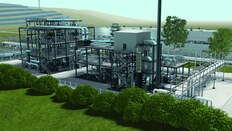- The facility receives €130 million funding from Germany's Federal Ministry for Digital and Transport Affairs.
- Construction began on October 1, 2024, with research operations starting in 2028.
- The facility will produce 2500 tonnes of e-fuels annually on a semi-industrial scale.
- E-fuels aim to reduce CO2 and non-CO2 emissions like nitrogen oxides and soot.

Project Overview
The German Aerospace Center is constructing a major research facility in Leuna, Germany, focused on the production of electricity-based fuels, known as e-fuels. This Technology Platform for Power-to-Liquid Fuels (TPP) aims to optimize e-fuels and develop technologies for industrial-scale production.
Funding and Timeline
The project is supported by €130 million from Germany's Federal Ministry for Digital and Transport Affairs, with additional funding planned for research operations. Construction began on October 1, 2024, and research operations are scheduled to start in 2028.
Production Capacity
The facility will have the capacity to produce 2500 tonnes of e-fuels annually on a semi-industrial scale. Its modular design allows for future expansion and integration of additional research topics.
Technological Goals
DLR aims to bridge the gap between research and industrial production of e-fuels, focusing on scaling up technologies and optimizing production processes. The facility will test and improve procedures for industrial-scale production, aiming to make them economically viable.
Environmental Impact
E-fuels produced at the facility are designed to reduce CO2 and non-CO2 emissions, such as nitrogen oxides and soot. This is particularly significant for aviation, where non-CO2 effects can have a greater climate impact than CO2 alone.

